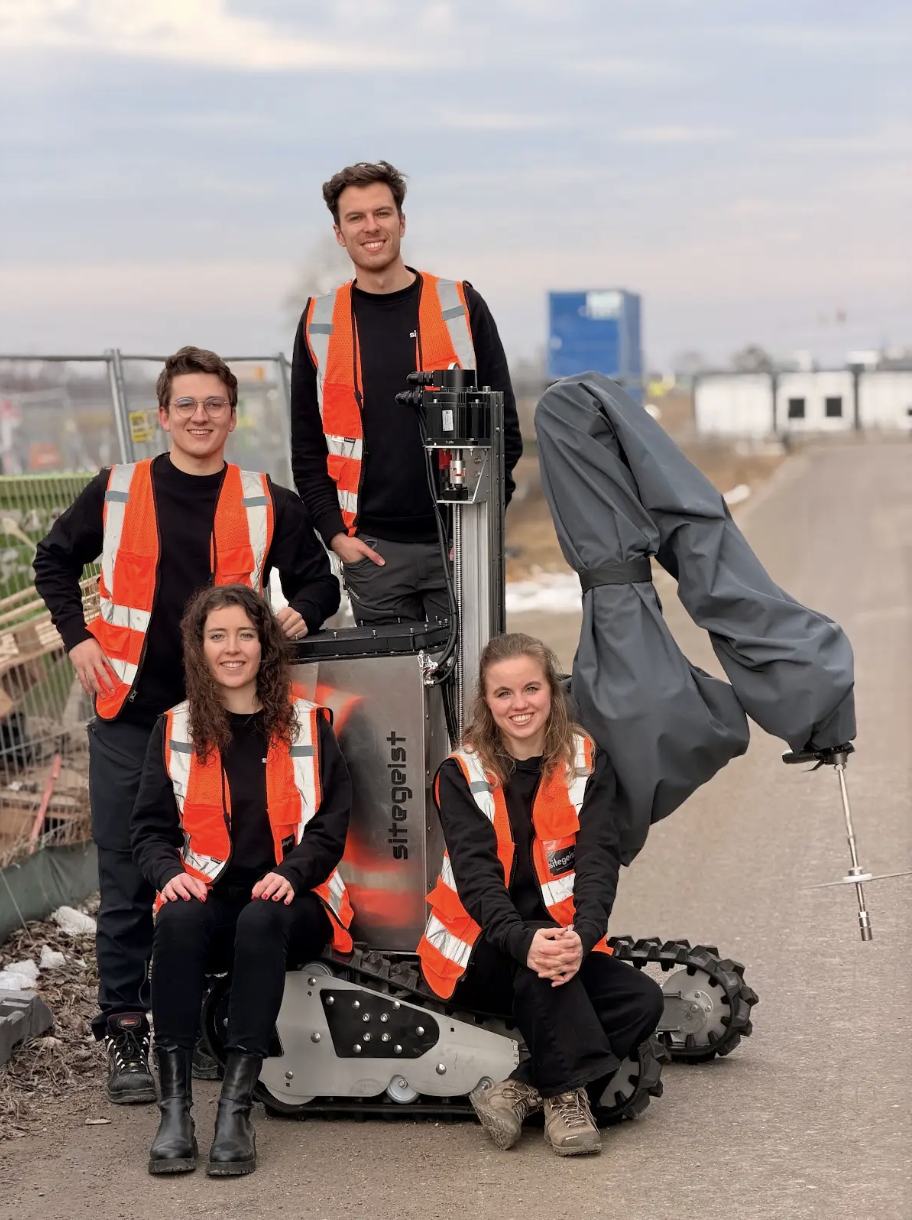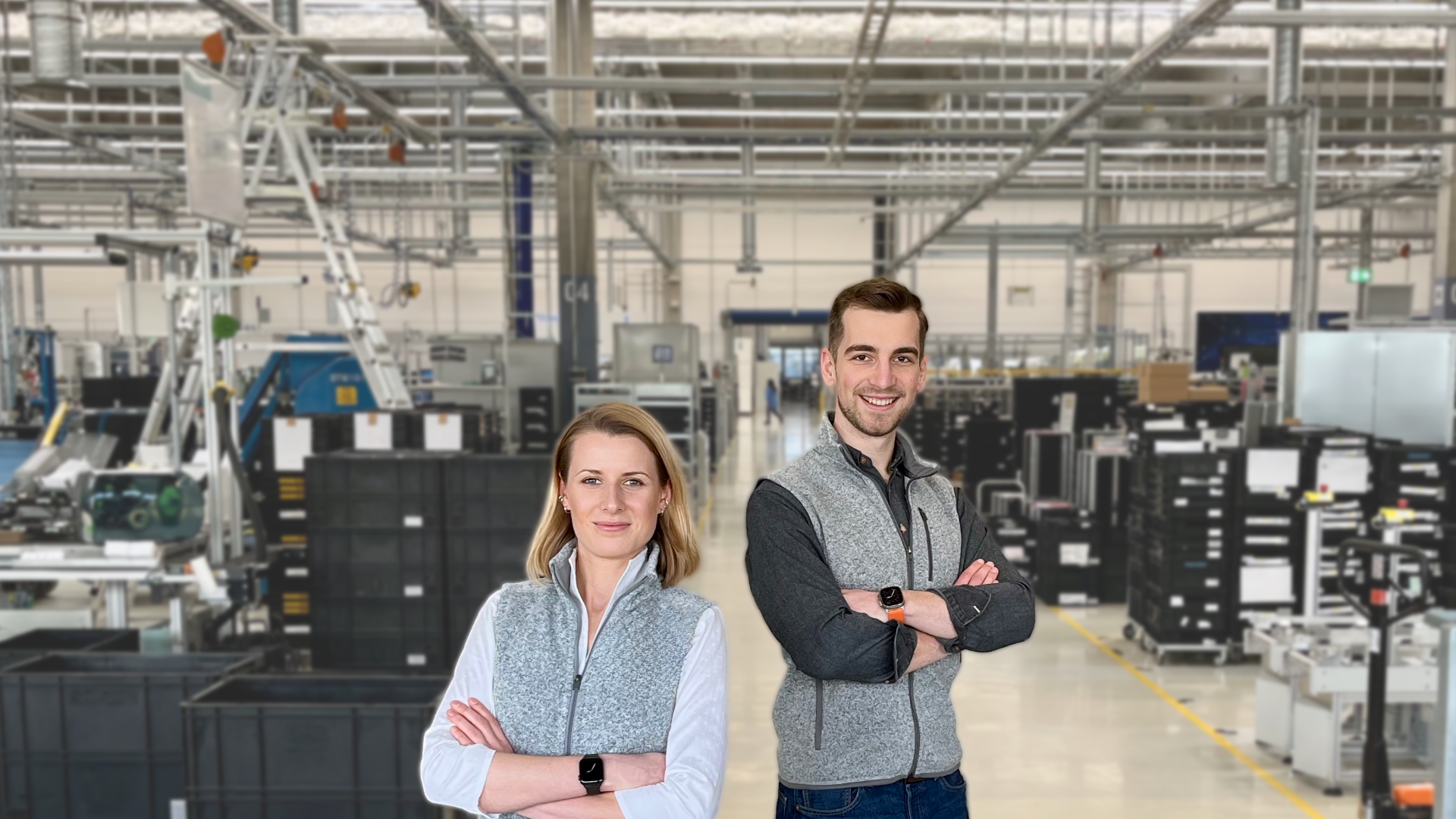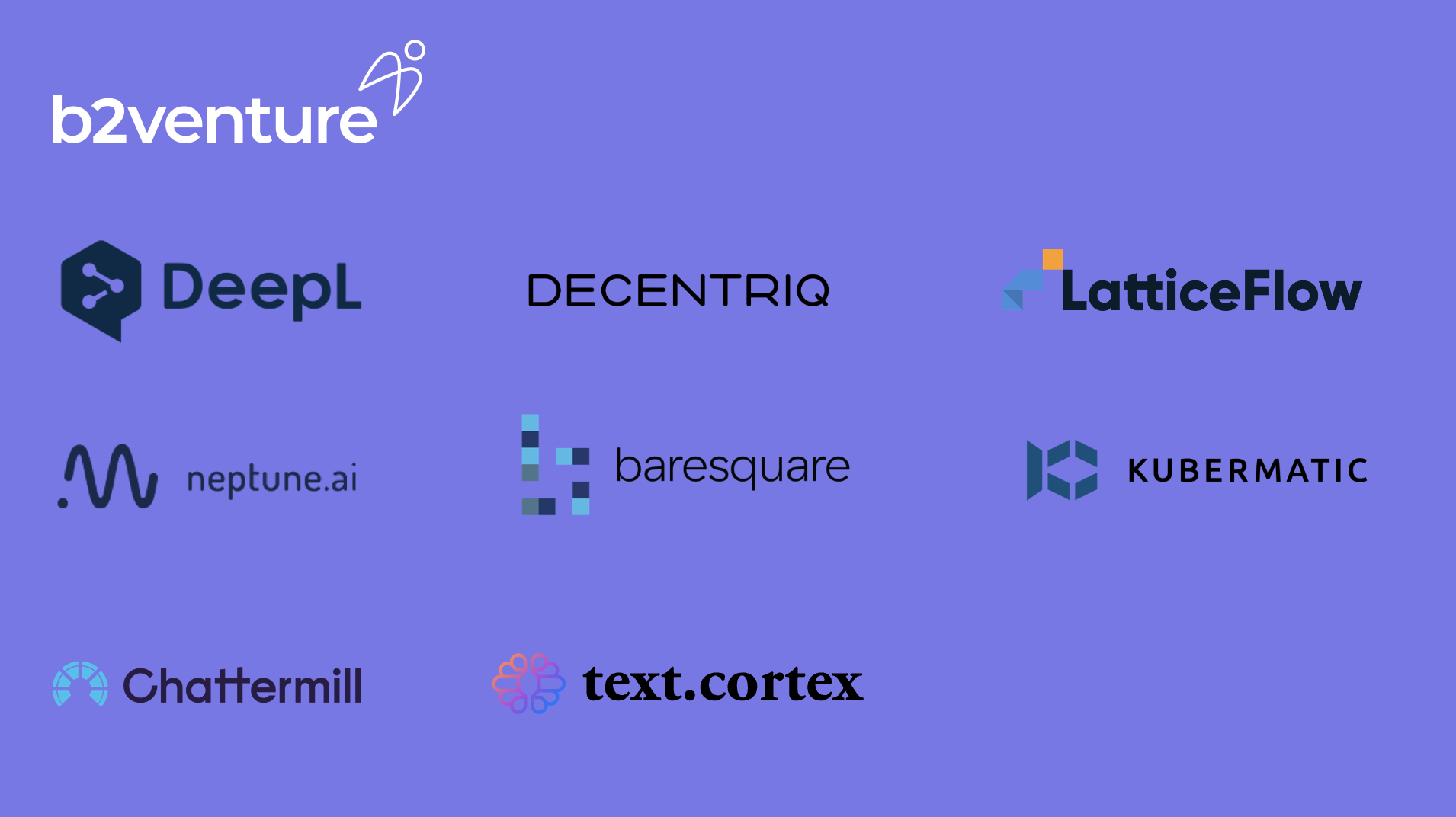Exploring TechBio and the Potential to Transform Pharma with Generative AI
Exploring TechBio and the Potential to Transform Pharma with Generative AI
This piece primarily comes from a venture capital perspective, which focuses on building a company with outsized outcomes and category winners. Please take the following information into consideration as the venture world is biased towards these kinds of outcomes.

At b2venture, we’ve been partnering with teams building AI-based companies in the life sciences fields for quite some time (e.g., Healx, RetinAI and more recently DUDE CHEM in the field of chemical manufacturing). The intersection of AI and life sciences is not new: 2016’s release of DeepMind’s AlphaFold kicked off a wave of AI-driven innovation in the field, with the system correctly predicting 3D protein structures from amino acids, accelerating research across biology fields and decreasing cost and timelines for drug development. Over the last few years, the rise of large language models (LLMs) combined with computational advances including quantum computing have been enabling more complex analyses and new solutions for sequencing and protein engineering. The McKinsey Global Institute (MGI) has forecasted USD 60 to 110 billion a year in economic value for pharma companies from GenAI by accelerating processes across the value chain from drug discovery, clinical trials all the way to regulatory approval and marketing. The new wave of founding teams building in this combination of big data and developments in GenAI to tackle problems in life sciences and medicine has lead to a new category: TechBio.
Despite the advancements and lofty value estimates, investor excitement in the space has cooled, with our colleagues at SpeedInvest finding that TechBio companies raised only half the amount in 2023 (USD 1.2 billion) compared to the previous year. This goes along with the sobering realisation that reduced timelines and cost in the drug discovery phase so far did not translate into higher clinical success rates of GenAI-designed drugs.
Still, we believe there’s ample need and opportunity for founders building GenAI solutions to bring significant improvements in the life sciences value chain - which is still characterized by long timelines, billion dollar investments to fund the journey of one drug from lab to market, and costly clinical trial processes. From exploring the space and speaking with founders, investors and industry experts, I’ve seen a few factors that I believe are important to consider for founding teams building in this space:
1. AI-generated engineerings need real-world proof points
GenAI makes the process of identifying targets, testing compounds, singling out the most promising leads, and assisting in preclinical effectiveness and testing more efficient and precise. Yet there is an inherent risk as to whether AI-generated chemicals and molecules will translate to the real-world production processes at scale as intended when other ingredients come into play. This validation often becomes a bottleneck for teams focusing on the discovery process through GenAI platforms. Start-ups are increasingly expanding their footprint across the value chain and closing the initial feedback loop on their generated engineerings by owning wet-labs or partnering with CROs (e.g., Cradle, Owkin).
Since the wet-lab stages in the value chain have high capital requirements, there are additional implications for VCs investing intro these types of companies at early stages with typical AI valuations. Challenges arise when these AI companies then suddenly become biotech companies once they move to the clinical stages and are confronted with the same hurdles of classic biotech companies, often accompanied by a downward valuation adjustment. Forming partnerships early on or concluding licensing deals, for example, can be helpful.
2. Proprietary quality data remains the GenAI differentiator
In the TechBio space, new (Gen)AI models are almost ubiquitous, making it hard for teams to build a long-term differentiating business purely on the basis of the superiority of their ML algorithms. Access to proprietary data (e.g., from in-house experiments and pilot customers) is needed to build a moat around IP. Researchers and academics can be good pilot customers to extend databases and avoid the cold start problem.
3. Clinical trials are the cost driver in the value chain
When a company is in the R&D stages of a potential drug, there’s typically no revenue — as a result it’s not uncommon for biotech companies to burn through millions of dollars of capital before the commercial viability of a drug can even be determined. Start-ups like flow.bio, DeepMirror, and Atlas Bio are addressing this by offering R&D solutions that bring the process into the cloud, use GenAI to suggest to teams which engineerings to synthesize and test next, and try to predict earlier on what will happen in clinical trials (i.e., faster speed, lower cost, improved probability of success).
The focus of these companies as of today is often on the first few R&D stages, such as de novo design, drug response analysis, molecule optimization, and screening. However, pharmaceutical R&D alone consists of approximately 10 phases and takes 12-15 years, so the impact in relation to the full value chain has so far beeen limited. Additionally, most of the drug candidates fail in the clinical trials, making all of the developments incremental. We are very interested in teams who can believably argue that their impact extends to the later R&D stages and even clinical trials, since this is the longest and most costly step in the value chain.
4. Compliance & content co-pilots are an underserved segment
We’re particularly excited about the potential GenAI can have on primarily text-based processes: From the clinical trial process by supporting the requests from regulatory agencies (HAQs), to creating documents that secure IP and patents for companies, to tailoring marketing messages and reviewing compliance of medical claims in the creation of new products: this is an area in which GenAI-based tools promise significant speed and cost efficiency improvements that can have a direct impact on the top line of a company.
5. Teams are leveraging economies of scale beyond pharma
In general, commercialization of precision fermentation products has moved beyond pharmaceuticals over the past years (primarily driven by a dramatic decrease in DNA sequencing cost). TechBio startups like Eden Bio, which provide GenAI models to guide R&D decisions and process optimization for yield improving protein strains, are leveraging this to apply their solutions to fields like food, cosmetics and materials. The argument is that a price decrease will increasingly enable the use of lab-grown ingredients, which are still rare in food and cosmetics today due to their price tag (though similar to drug development, the cost driver is not only R&D, but also lies in expensive downstream purification processes). It’s easy to see how teams that can establish business models which enable them to license proven products to several companies in different fields (for example, a yield-improving engineering for use in pharmaceuticals plus food) might have an advantage over others.
With tighter margins than in pharmaceuticals, it's especially important to understand underlying unit economics of the provided products (i.e., the cost of 1g of pure protein at 1l / 50l / 5,000l production). There's also complexities to consider in food and cosmetics production: Scaling from milliliters to thousands of liters in bio-production with the desired outcomes is not a given, which is why we usually look into which hosts the team are working with and why, how easy these are to scale and what byproducts can arise in the production process.
6. Teams need to combine domain expertise & GTM strategy
With complex processes and stakeholders in the market, we are looking for teams that combine work experience in the biotech field and first-hand understanding of the challenges with commercialization. Long sales cycles are endemic in the pharmaceutical industry and important for a startup’s GTM, so a robust network with trusted industry connections is a significant advantage for founding teams - especially as access to large-scale production facilities is typically a bottleneck. As a sidenote for early-stage investors in this area: given that pharmaceutical companies with billions in revenues, such as Roche and Astra Zeneca, are often happy to test new solutions with USD 50k-100k pilot projects, it’s really the second-time contracts that provide proof of value and recurring revenue of customers.
7. Data revolution: Increasing need for data administration and storage
With the huge amounts of biological data from testing (estimates predict that genomics research will generate between 2 and 40 exabytes of data within the next decade), there is a clear need for better data administration and storage solutions. On a micro-level, this trend could lead to the emergence of innovative data management and storage solutions tailored for the biotech industry, enhancing the efficiency of data analysis and interpretation. We’re also excited to see completely new ways of addressing data storage, such as storing data on DNA itself.
8. Open question: Computation with silicon AI vs. Quantum vs. others
This is more a thought experiment than a concrete learning at this point. As outlined above, complex analyses are needed due to different types of cells and communication. We are yet to see how different computation approaches work together, with regards to accuracy especially depending on data availability, speed and cost:
a) Silicon-based AI with specialized LLMs that are pre-trained on types of lifescience analyses (e.g., DNA), with advances so far made by start-ups (e.g., Owkin spin-out Bioptimus), incumbents (e.g., GE Healthcare, Deepmind) and scientists (e.g., Stanford, MIT)
b) Quantum Computing is likely to play a role in speeding up analyses along parts of the value chain as soon as the next few years (e.g., Gero), and the emergence of general purpose QCs might fully disrupt the field
c) Natural neural networks might help to address shortcomings of current AI systems, especially on intractable and data-deficit problems
Conclusion
TechBio presents a host of opportunities and challenges - the pharmaceutical industry continues to grapple with long timelines and high costs, and GenAI appears poised to transform many aspects of drug discovery and development. As we’re moving beyond initial excitement, we’re excited for solutions that are able to demonstrate real-world validation of AI-generated proposals, and integrate proprietary data to create sustainable advantages.
The emerging field of precision fermentation and the ongoing evolution in data management further exemplify how technology can broaden the scope and impact of biotechnological applications beyond the pharmaceuticals industry, into areas like food and cosmetics. Yet the pathway to success in this space is complex, requiring teams who not only bring forward technological innovation but also embody a deep understanding of the market and regulatory nuances.
This list is by no means exhaustive and very likely to evolve, so we’re always keen to hear the thoughts of teams building in this space or other investors - let me know what you think and if you have other views on what I’ve covered in this post : marisa.krummrich@b2venture.vc.
_________________________________________________________________________________
Thanks to the many people who have spent time discussing these fields with me, including my colleagues Sabrina and Jan-Hendrik, Carolina Villa (Principal at Nucleus Capital), and Tobias Silberzahn (Partner at McKinsey and leader of the global Health Tech Network) who provided helpful comments and insights for this article!
This piece primarily comes from a venture capital perspective, which focuses on building a company with outsized outcomes and category winners. Please take the following information into consideration as the venture world is biased towards these kinds of outcomes.

At b2venture, we’ve been partnering with teams building AI-based companies in the life sciences fields for quite some time (e.g., Healx, RetinAI and more recently DUDE CHEM in the field of chemical manufacturing). The intersection of AI and life sciences is not new: 2016’s release of DeepMind’s AlphaFold kicked off a wave of AI-driven innovation in the field, with the system correctly predicting 3D protein structures from amino acids, accelerating research across biology fields and decreasing cost and timelines for drug development. Over the last few years, the rise of large language models (LLMs) combined with computational advances including quantum computing have been enabling more complex analyses and new solutions for sequencing and protein engineering. The McKinsey Global Institute (MGI) has forecasted USD 60 to 110 billion a year in economic value for pharma companies from GenAI by accelerating processes across the value chain from drug discovery, clinical trials all the way to regulatory approval and marketing. The new wave of founding teams building in this combination of big data and developments in GenAI to tackle problems in life sciences and medicine has lead to a new category: TechBio.
Despite the advancements and lofty value estimates, investor excitement in the space has cooled, with our colleagues at SpeedInvest finding that TechBio companies raised only half the amount in 2023 (USD 1.2 billion) compared to the previous year. This goes along with the sobering realisation that reduced timelines and cost in the drug discovery phase so far did not translate into higher clinical success rates of GenAI-designed drugs.
Still, we believe there’s ample need and opportunity for founders building GenAI solutions to bring significant improvements in the life sciences value chain - which is still characterized by long timelines, billion dollar investments to fund the journey of one drug from lab to market, and costly clinical trial processes. From exploring the space and speaking with founders, investors and industry experts, I’ve seen a few factors that I believe are important to consider for founding teams building in this space:
1. AI-generated engineerings need real-world proof points
GenAI makes the process of identifying targets, testing compounds, singling out the most promising leads, and assisting in preclinical effectiveness and testing more efficient and precise. Yet there is an inherent risk as to whether AI-generated chemicals and molecules will translate to the real-world production processes at scale as intended when other ingredients come into play. This validation often becomes a bottleneck for teams focusing on the discovery process through GenAI platforms. Start-ups are increasingly expanding their footprint across the value chain and closing the initial feedback loop on their generated engineerings by owning wet-labs or partnering with CROs (e.g., Cradle, Owkin).
Since the wet-lab stages in the value chain have high capital requirements, there are additional implications for VCs investing intro these types of companies at early stages with typical AI valuations. Challenges arise when these AI companies then suddenly become biotech companies once they move to the clinical stages and are confronted with the same hurdles of classic biotech companies, often accompanied by a downward valuation adjustment. Forming partnerships early on or concluding licensing deals, for example, can be helpful.
2. Proprietary quality data remains the GenAI differentiator
In the TechBio space, new (Gen)AI models are almost ubiquitous, making it hard for teams to build a long-term differentiating business purely on the basis of the superiority of their ML algorithms. Access to proprietary data (e.g., from in-house experiments and pilot customers) is needed to build a moat around IP. Researchers and academics can be good pilot customers to extend databases and avoid the cold start problem.
3. Clinical trials are the cost driver in the value chain
When a company is in the R&D stages of a potential drug, there’s typically no revenue — as a result it’s not uncommon for biotech companies to burn through millions of dollars of capital before the commercial viability of a drug can even be determined. Start-ups like flow.bio, DeepMirror, and Atlas Bio are addressing this by offering R&D solutions that bring the process into the cloud, use GenAI to suggest to teams which engineerings to synthesize and test next, and try to predict earlier on what will happen in clinical trials (i.e., faster speed, lower cost, improved probability of success).
The focus of these companies as of today is often on the first few R&D stages, such as de novo design, drug response analysis, molecule optimization, and screening. However, pharmaceutical R&D alone consists of approximately 10 phases and takes 12-15 years, so the impact in relation to the full value chain has so far beeen limited. Additionally, most of the drug candidates fail in the clinical trials, making all of the developments incremental. We are very interested in teams who can believably argue that their impact extends to the later R&D stages and even clinical trials, since this is the longest and most costly step in the value chain.
4. Compliance & content co-pilots are an underserved segment
We’re particularly excited about the potential GenAI can have on primarily text-based processes: From the clinical trial process by supporting the requests from regulatory agencies (HAQs), to creating documents that secure IP and patents for companies, to tailoring marketing messages and reviewing compliance of medical claims in the creation of new products: this is an area in which GenAI-based tools promise significant speed and cost efficiency improvements that can have a direct impact on the top line of a company.
5. Teams are leveraging economies of scale beyond pharma
In general, commercialization of precision fermentation products has moved beyond pharmaceuticals over the past years (primarily driven by a dramatic decrease in DNA sequencing cost). TechBio startups like Eden Bio, which provide GenAI models to guide R&D decisions and process optimization for yield improving protein strains, are leveraging this to apply their solutions to fields like food, cosmetics and materials. The argument is that a price decrease will increasingly enable the use of lab-grown ingredients, which are still rare in food and cosmetics today due to their price tag (though similar to drug development, the cost driver is not only R&D, but also lies in expensive downstream purification processes). It’s easy to see how teams that can establish business models which enable them to license proven products to several companies in different fields (for example, a yield-improving engineering for use in pharmaceuticals plus food) might have an advantage over others.
With tighter margins than in pharmaceuticals, it's especially important to understand underlying unit economics of the provided products (i.e., the cost of 1g of pure protein at 1l / 50l / 5,000l production). There's also complexities to consider in food and cosmetics production: Scaling from milliliters to thousands of liters in bio-production with the desired outcomes is not a given, which is why we usually look into which hosts the team are working with and why, how easy these are to scale and what byproducts can arise in the production process.
6. Teams need to combine domain expertise & GTM strategy
With complex processes and stakeholders in the market, we are looking for teams that combine work experience in the biotech field and first-hand understanding of the challenges with commercialization. Long sales cycles are endemic in the pharmaceutical industry and important for a startup’s GTM, so a robust network with trusted industry connections is a significant advantage for founding teams - especially as access to large-scale production facilities is typically a bottleneck. As a sidenote for early-stage investors in this area: given that pharmaceutical companies with billions in revenues, such as Roche and Astra Zeneca, are often happy to test new solutions with USD 50k-100k pilot projects, it’s really the second-time contracts that provide proof of value and recurring revenue of customers.
7. Data revolution: Increasing need for data administration and storage
With the huge amounts of biological data from testing (estimates predict that genomics research will generate between 2 and 40 exabytes of data within the next decade), there is a clear need for better data administration and storage solutions. On a micro-level, this trend could lead to the emergence of innovative data management and storage solutions tailored for the biotech industry, enhancing the efficiency of data analysis and interpretation. We’re also excited to see completely new ways of addressing data storage, such as storing data on DNA itself.
8. Open question: Computation with silicon AI vs. Quantum vs. others
This is more a thought experiment than a concrete learning at this point. As outlined above, complex analyses are needed due to different types of cells and communication. We are yet to see how different computation approaches work together, with regards to accuracy especially depending on data availability, speed and cost:
a) Silicon-based AI with specialized LLMs that are pre-trained on types of lifescience analyses (e.g., DNA), with advances so far made by start-ups (e.g., Owkin spin-out Bioptimus), incumbents (e.g., GE Healthcare, Deepmind) and scientists (e.g., Stanford, MIT)
b) Quantum Computing is likely to play a role in speeding up analyses along parts of the value chain as soon as the next few years (e.g., Gero), and the emergence of general purpose QCs might fully disrupt the field
c) Natural neural networks might help to address shortcomings of current AI systems, especially on intractable and data-deficit problems
Conclusion
TechBio presents a host of opportunities and challenges - the pharmaceutical industry continues to grapple with long timelines and high costs, and GenAI appears poised to transform many aspects of drug discovery and development. As we’re moving beyond initial excitement, we’re excited for solutions that are able to demonstrate real-world validation of AI-generated proposals, and integrate proprietary data to create sustainable advantages.
The emerging field of precision fermentation and the ongoing evolution in data management further exemplify how technology can broaden the scope and impact of biotechnological applications beyond the pharmaceuticals industry, into areas like food and cosmetics. Yet the pathway to success in this space is complex, requiring teams who not only bring forward technological innovation but also embody a deep understanding of the market and regulatory nuances.
This list is by no means exhaustive and very likely to evolve, so we’re always keen to hear the thoughts of teams building in this space or other investors - let me know what you think and if you have other views on what I’ve covered in this post : marisa.krummrich@b2venture.vc.
_________________________________________________________________________________
Thanks to the many people who have spent time discussing these fields with me, including my colleagues Sabrina and Jan-Hendrik, Carolina Villa (Principal at Nucleus Capital), and Tobias Silberzahn (Partner at McKinsey and leader of the global Health Tech Network) who provided helpful comments and insights for this article!

The Author

Marisa Krummrich
Investment Manager
Marisa is Investment Manager in the b2venture Fund team and focuses on horizontal AI, AI tooling, and vertical enterprise applications that utilize AI as the key enabler.
Team







.jpg)












.png)




.jpg)
-min.png)


.jpg)













































.jpg)





















